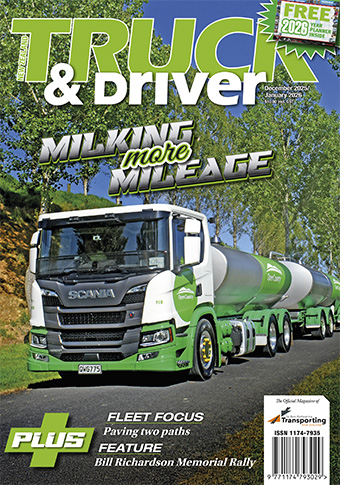Aeolus Truck & Driver News


Licence exemption to boost BEV productivity
Aeolus Truck & Driver News
A new driver licensing exemption should offer greater scope to introduce light-duty battery electric (BEV) truck models to New Zealand business.
NZTA published the Exemption Notice on February 28, allowing drivers with a full Class 1 licence to drive some electric trucks up to a gross laden weight (GLW) of 7,500kg (instead of 6,000kg previously).
Keeping battery electric trucks below the 6,000kg weight threshold for driver licence Class 1 reduces payload, due to the weight of the batteries.
The exemption is to compensate for the weight of batteries and has potential to open up new roles for BEV trucks in sectors such as chilled food distribution and some traffic management work.
...A new driver licensing exemption should offer greater scope to introduce light-duty battery electric (BEV) truck models to New Zealand business.
NZTA published the Exemption Notice on February 28, allowing drivers with a full Class 1 licence to drive some electric trucks up to a gross laden weight (GLW) of 7,500kg (instead of 6,000kg previously).
Keeping battery electric trucks below the 6,000kg weight threshold for driver licence Class 1 reduces payload, due to the weight of the batteries.
The exemption is to compensate for the weight of batteries and has potential to open up new roles for BEV trucks in sectors such as chilled food distribution and some traffic management work.
The Exemption Notice is for a three-year term, remaining in force till February 28 2028. It applies to BEV models which are a variant of an existing diesel model with a maximum GLW of 6,000kg.
NZTA consulted with a number of industry groups before granting the exemption.
Industry feedback has shaped the requirements for the trucks to not exceed the exterior dimensions of the largest variant of 6,000kg diesel models and the vehicle must be equipped with Regenerative Braking, Automatic Emergency Braking, and Electronic Stability Control along with either Lane Departure Warning or Lane Keep Assist functions.
There is also a requirement for the batteries to be integrated with the chassis.
NZTA says the intention of the exemption it that drivers of these trucks would be operating in a commercial environment and subject to Health and Safety workplace regulation. Employers have responsibility to make sure their drivers are adequately trained and are capable drivers.
The drivers of these trucks will be subject to worktime and logbook requirements and must work under a Transport Service Licence, which provides an extra safeguard for drivers in managing heavier vehicles safely.
The exemption means that fleets can introduce more practical EV models without needing drivers with a Class 2 licence.
As an example, previously Class 1 licence holders could drive the smallest (6t) version of the JAC Truck EV range (the N60 EV). The exemption will now allow them to drive the 7.5t N75 EV model.
Andrew Craw, General Manager of JAC New Zealand says the exemption provides more options for potential EV light duty customers.
“The new exemption for EV Trucks represents a huge opportunity for the industry to transition to EV as it takes away the barrier of having to have a Class 2 Licence for even more use cases for EV Trucks.
“JAC now has two variants of EV Truck that can be driven on a Class 1 Licence with both the N60ev (6T GVM) and the N75ev (7.5T GVM).
“We’ve already seen good uptake of the N60ev in areas such as food distribution, so the increase in potential payload is a great opportunity to get even more efficiency out of each run.”
The Fuso eCanter also meets the requirements of the exemption with the 7.5t model now able be driven by a person with a Class 1 licence.
“Refrigerated transport, building supplies, traffic management and waste collection operators are the industries that want to move to the eCanter 8, but have been held back from our current licencing rule. This now creates an opportunity for change to the future,” says Sophie Song, Marketing Manager for Keith Andrews Trucks.
“With this exemption the eCanter will be able to carry the same payload as its equivalent diesel vehicle, but still be driven by a Class 1 driver.
“We are thankful to NZTA and MOT and the ministers who can see that we need to look for solutions in legislation. Financial assistance helps but can only get us so far on the journey to a zero-emission future.”
The purpose of this class exemption is to improve commercial operators’ access to BEV’s with improved safety features and provides the sector an opportunity to makes gains in the decarbonisation of their fleet, while the government considers the growing demand for BEVs in the land transport system.
The exemption is a response to the current driver licensing system being a challenge to the introduction of EVs, imposing compliance costs on industry for no safety benefit.
This is a temporary solution while potential wider changes to the Driver Licensing Rule are progressed.



 + EQUIPMENT GUIDE - FREE
+ EQUIPMENT GUIDE - FREE
